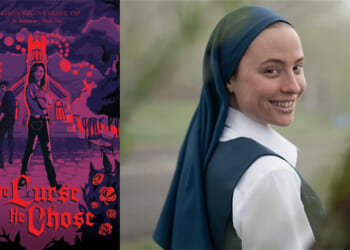
What would happen if, by God’s grace, every man, woman, and child accepted the Gospel of Jesus Christ and sought to live out our Savior’s command to “be perfect, as your heavenly Father is perfect”?1 While unbelievers may pin their hopes on establishing an earthly utopia through idealistic political systems, Christians know that the real source of the problem lies somewhere else. As long as human hearts are too selfish to trust in God and reject sin, the world in which we live will include violence and hatred. And murder.
The book of Leviticus states that “he who kills a man should be put to death.”2 This punishment sounds severe to modern ears, but it was a dramatic improvement over the unrestricted acts of vengeance which were common practice in the ancient world. When our Lord came, He transformed our understanding of how to respond to acts of human cruelty through His teachings about love and forgiveness, as well as His death on the Cross. But what should be done when an individual violates God’s command—and civil law—and takes the life of another?
As Genesis 4:10 says, the blood of the innocent victim cries out to God Himself for vengeance. The Catechism of the Catholic Church examines the Catholic response to acts of murder in some detail.3 While mercy and forgiveness are core Christian teachings, the fact remains that the act of intentional homicide has been punished through the death penalty by peoples, nations, and the Church throughout history.
Since our Savior was Himself a victim of capital punishment, Catholics can certainly understand the late Pope Francis’ abhorrence of the death penalty. But Francis’s statement that “the death penalty is inadmissible because it is an attack on the inviolability and dignity of the person,”4 did not dramatically change Church teaching. After all, the word “inadmissible”5 occurs only one time in the entire Catechism, and many Church leaders and even popes have made use of capital punishment over the centuries.6
On the other hand, the following statement by Saint Pope John Paul II sheds light on how the Church can justly evaluate the death penalty in the modern world:
It is clear that, for these purposes to be achieved [that is, defending public order, ensuring people’s safety, and offering the offender an incentive and rehabilitation], the nature and extent of the punishment must be carefully evaluated and decided upon, and ought not go to the extreme of executing the offender except in cases of absolute necessity: in other words, when it would not be possible otherwise to defend society. Today however, as a result of steady improvements in the organization of the penal system, such cases are very rare, if not practically non-existent.7
There is much more that could be said about Church teaching on the death penalty.8 But the purpose of this article is to focus on a more practical question. That is, how have the best Catholics—the saints—responded to the problem of balancing justice and mercy when caring for those in prison and in danger of death?
Throughout the history of the Church, thousands of Catholic saints and blesseds have died as martyrs for their faith. Some of those martyrs were condemned without a trial, such as Saint John the Baptist. Other martyrs were granted a trial, but their guilt was a foregone conclusion, as was the case with Saint Joan of Arc. These examples should remind us of the importance of a just and fair trial.
Saints have often encouraged secular leaders to practice mercy toward serious offenders. For example, the fourth-century French bishop Saint Martin of Tours pleaded with Roman emperor Magnus Maximus to permit a group of heretics to be excommunicated rather than executed. When civil authorities put them on trial and beheaded them anyway, the pope formally censured him.
Visiting those in prison is, of course, a corporal work of mercy. For example, Christians in the early Church visited their imprisoned brothers and sisters. In more modern times, many priests have been imprisoned for their faith and died while caring for other prisoners, as has happened in England,9 France,10 Poland,11 and Vietnam.12
Saint Joseph Cafasso spent at least two decades ministering to prisoners in nineteenth-century Italy, caring for their material needs but also attempting to lead them back to God. Cafasso had a personal ministry with those on death row and walked with fifty-seven men all the way to the scaffold, praying with and for them the entire time. As Pope Benedict XVI put it, the priest “accompanied them with deep love until the last breath of their earthly existence.”13
Saint Genevieve of Paris was so respected for her holiness that she was sometimes able to convince the French king to release people who had been imprisoned. Saints Acacius of Amida was a fifth-century bishop who redeemed thousands of captives from prison. Saint Licinius of Angers was a seventh-century bishop who had a personal ministry to those who were poor or imprisoned. Saint Juan Grande was a religious brother who cared for prisoners and the sick in seventeenth-century Spain. In the nineteenth century, Blessed Honorat Kożmiński started his own prison ministry and religious order in Poland. Blessed Anna Maria Adorni Botti began caring for female prisoners after she was widowed and eventually founded a religious order in nineteenth-century Italy.
In the twentieth century, Blessed Enrichetta Alfieri was nicknamed “the Angel of San Vittore” for her ministry to women prisoners in a Milanese prison by that name. The religious sister was briefly imprisoned by the Nazis on a false charge of espionage during World War II. After the war, when the prisons were filled with prisoners of war—those who had collaborated with fascism and her own former jailors—she continued her ministry of compassion.
Saint Catherine of Siena is probably best known for her spiritual writings. But she also cared deeply about the salvation of every soul. When a young man named Niccolo di Toldo was condemned to death for speaking against the city’s government, he was initially angry.14 Then he despaired. Catherine visited him, comforted him, and helped to restore his trust in God’s mercy. On the day of his execution, she accompanied him to Mass, where he received his First Holy Communion, and she walked with him to his death, praying with him and encouraging him to the very end.
God is merciful, but He is also just, and justice requires punishment. For example, if you pick someone’s pocket while standing in Saint Peter’s Square and are caught, you will be arrested. (However, you will probably simply be fined since the Vatican’s Gendarmerie apparently has only three prison cells and no gendarmes on duty at night.) While not everyone repents of their crimes when threatened with possible execution, some people do.
When twenty-seven-year-old Jacques Fesch (1930-1957) was convicted of murdering a police officer, it certainly appeared that justice had been done. Fesch was raised in a wealthy home in France and had been given many opportunities to turn his life around before he tried to rob a store with a couple of friends. There were plenty of witnesses to the fact that he had intentionally shot the pursuing police officer, and he seemed completely unrepentant at his trial. The French press vilified him, and public opinion supported his execution.
During the three years that passed between Jacques’ arrest and execution, his lawyer encouraged him to pray. Jacques scoffed. He had abandoned God when he was a teenager. But life in a maximum-security prison made him start to think about his life.
Jacques’ mother was a pious Catholic and overly indulgent, perhaps to compensate for Jacques’ distant, critical father. Sensing that he would never be able to please his father by getting good grades, Jacques stopped trying. Around the time his parents divorced, teenaged Jacques was expelled from school. He entered the military and married his girlfriend after she became pregnant. When it was discovered that he had stolen money from his father-in-law’s business to buy presents for his mistresses, his wife kicked him out. Jacques then fathered an illegitimate child, and that child ended up in foster care. He spent money faster than he could make it and was fired from multiple jobs. He decided to rob a store solely so that he could buy a boat and (literally) sail away from his problems.
But, by God’s grace, those long hours of confinement, the lack of all his past amusements, and the possibility of execution made him start thinking. And reading. And eventually even praying. One day, he experienced hours of deep, emotional suffering, followed by absolute certitude and complete faith in God. As he later said, “I believed, and could no longer understand how I had ever not believed.”15
Jacques Fesch said yes to God in that moment. For the next few years, he devoted himself to prayer and the study of the Catholic faith. He stopped thinking only of himself and started trying to undo some of the damage he had caused. He took sole blame for the crime, saving his companions from some prison time. He wrote letters to his wife to prepare her for single parenthood and to try to lead her to faith in God. He also wrote to his mother-in-law and some male Catholic friends about his spiritual struggles. When all legal avenues to stop his execution had been exhausted, he was executed by guillotine after having received the final sacraments.
After Jacques’ death, a sympathetic priest and religious sister published a collection of his prison letters. Readers found these letters so inspirational that in 1987, the archbishop of Paris opened a diocesan inquiry into Jacques’ life, the first step toward canonization.
Interestingly, Servant of God Jacques Fesch died on October 1. Perhaps the most famous modern Frenchwoman, Saint Thérèse of Lisieux, died on September 30, and October 1 is now her feast day. Thérèse famously prayed for (and seemed to obtain) the conversion of a murderer named Henri Pranzini before his death, so she would have been delighted with Jacques’ story and its happy ending.
Of course, Jacques’ life remains controversial because he was, by his own admission, a murderer. But his story proves that one does not need to be a great saint to bring about a great conversion. God’s grace is waiting for us everywhere, even inside prison walls.
Endnotes:
1 Matt 5:48
2 See Lev 24:19-21.
3 See CCC, 2258-2283 and 2302-2317 for a discussion of related issues, such as acts of self-defense, accidental deaths, abortion, euthanasia, suicide, war, and peace.
4 See CCC, 2267, taken from a 2017 address by Pope Francis.
5 Compare this to the frequent use of words such as “permitted” or “condemned”.
6 One of the most controversial cases involves the execution of Dominican priest Girolamo Savonarola by Pope Alexander VI.
7 John Paul II, Evangelium Vitae, 1995, no. 56.
8 For a recent analysis of Church teaching on this topic, see Edward Feser and Joseph Bessette’s By Man Shall His Blood Be Shed: A Catholic Defense of Capital Punishment, Ignatius Press, 2017.
9 Blessed William Patenson was an English priest who died a martyr in an English prison in 1592.
10 Blessed Scipion-Jérôme Brigeat Lambert was a French priest who died a martyr in the prison hulks of Rochefort, France in 1794.
11 Blessed Timothy Trojanowski was a Polish Franciscan priest who died a martyr in the Auschwitz concentration camp in Poland in 1942.
12 Blessed Nicholas Bunkerd Kitbamrun was a priest from Thailand who died a martyr in a Vietnamese prison in 1944.
13 Benedict XVI, General Audience, 30 June 2010.
14 This episode is described by Catherine herself in Letter 20, which she wrote to her confessor, Blessed Raymond of Capua. The letter is included in this collection of her letters.
15 Augustin-Michel Lemonnier, Light over the Scaffold: Prison Letters of Jacques Fesch and Cell 18: Unedited Letters of Jacques Fesch, Sr. Mary Thomas Noble, O.P., trans. (New York: Society of Saint Paul, 1996), 27.
If you value the news and views Catholic World Report provides, please consider donating to support our efforts. Your contribution will help us continue to make CWR available to all readers worldwide for free, without a subscription. Thank you for your generosity!
Click here for more information on donating to CWR. Click here to sign up for our newsletter.











